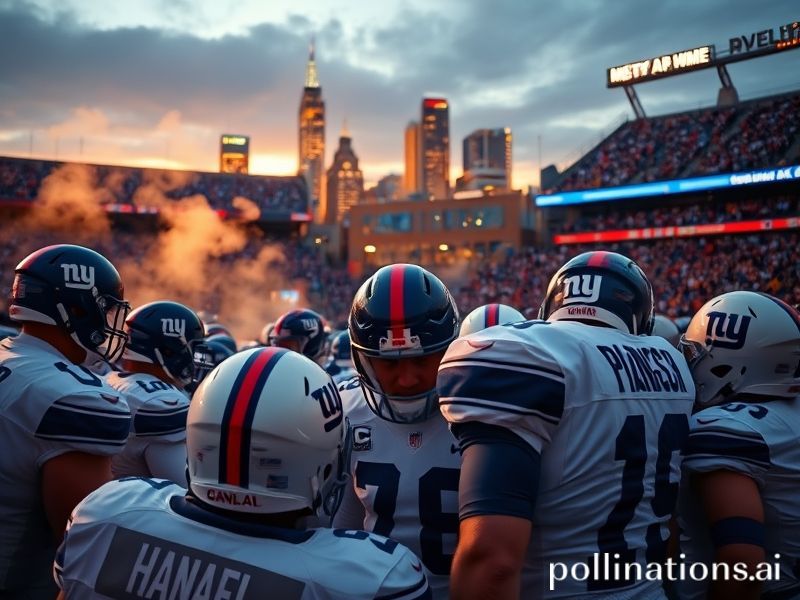New York Giants: America’s 2-6 Gift to Global Schadenfreude
The New York Giants, a franchise whose very name evokes both mythic enormity and the crushing weight of expectations, have long served as America’s accidental export of existential dread wrapped in shoulder pads. To the average fan from Jakarta to Johannesburg, they are less a football team than a weekly morality play about the futility of planning in an indifferent universe—an NFL telenovela dubbed into forty languages, subtitled “Same Script, New Cast.”
From a global vantage point, the Giants are the sporting equivalent of the United Nations Security Council: permanent, slow to act, and prone to vetoing their own best interests. Their 2024 season currently hovers at 2-6, a record that would qualify as a national emergency in most countries but is politely filed under “rebuilding year” in the United States, a phrase that translates roughly to “we have no idea what we’re doing, please send cap space.” The rest of the planet, accustomed to relegation systems that punish mediocrity with actual consequences, watches this ritual with the same bemusement reserved for American healthcare debates—equal parts horror and popcorn.
International bookmakers report a surge in “Giants to lose by less than a touchdown” wagers, a market so specific it has its own section on the London exchange, nestled between Polish parliamentary odds and Thai humidity futures. The appeal is simple: betting on the Giants is a low-risk method of self-flagellation for those too squeamish for actual whips. In Manila, office pools now use Giants losses as a hedge against typhoon season; statistically, both are inevitable, but at least the typhoon eventually leaves.
Diplomatically, the Giants serve as a soft-power Rorschach test. In Beijing, state media frames every interception as evidence of systemic American decline, conveniently ignoring their own real-estate sector doing the same thing with less padding. Meanwhile, Berlin tech conferences cite the Giants’ analytics department as a cautionary tale of data without wisdom—like using AI to optimize the deck chairs on the Titanic, then wondering why the Wi-Fi still drops at 30,000 feet. The French, ever poetic, call them “les Géants qui pleurent dans la pluie,” which sounds existential until you realize it’s just a literal description of their November home games.
The roster itself is a UN of disappointment: a Canadian offensive line that politely apologizes while surrendering sacks, a British punter whose accent is the only thing traveling over 50 yards, and a quarterback controversy so toxic it could be the plot of a Greek tragedy if Dionysus had a salary cap. Their star running back, imported from the Balkans, averages 3.2 yards per carry—coincidentally the same distance most EU summits move on any given issue.
But perhaps the Giants’ greatest global contribution is pedagogical. MBA programs in Mumbai now use the franchise’s fourth-quarter collapses as a case study in “normalization of deviance,” the corporate art of repeatedly failing upward until failure itself becomes a brand asset. Consultants bill $800 an hour to explain why throwing deep on 3rd-and-1 is the same as launching a new product line without market research, only with slightly better helmets.
As the season trudges toward its merciful conclusion, international viewers are left with a singular takeaway: the New York Giants are not merely bad at football; they are a masterclass in the human condition’s capacity for hope against geometrically diminishing returns. Every Sunday, millions tune in not for victory, but for the communal reassurance that somewhere, someone is having a worse week than they are. In that sense, the Giants are America’s most generous export—proof that even in the land of manifest destiny, you can still fumble destiny on the one-yard line and sell the replay rights to a streaming service in Singapore.
Conclusion: In a world teetering between climate deadlines and algorithmic overlords, the New York Giants offer a perverse comfort: the universe may be expanding, but at least it’s expanding at 2-6. Somewhere in the cosmic ledger, that counts as consistency—and in 2024, consistency is the darkest joke of all.







